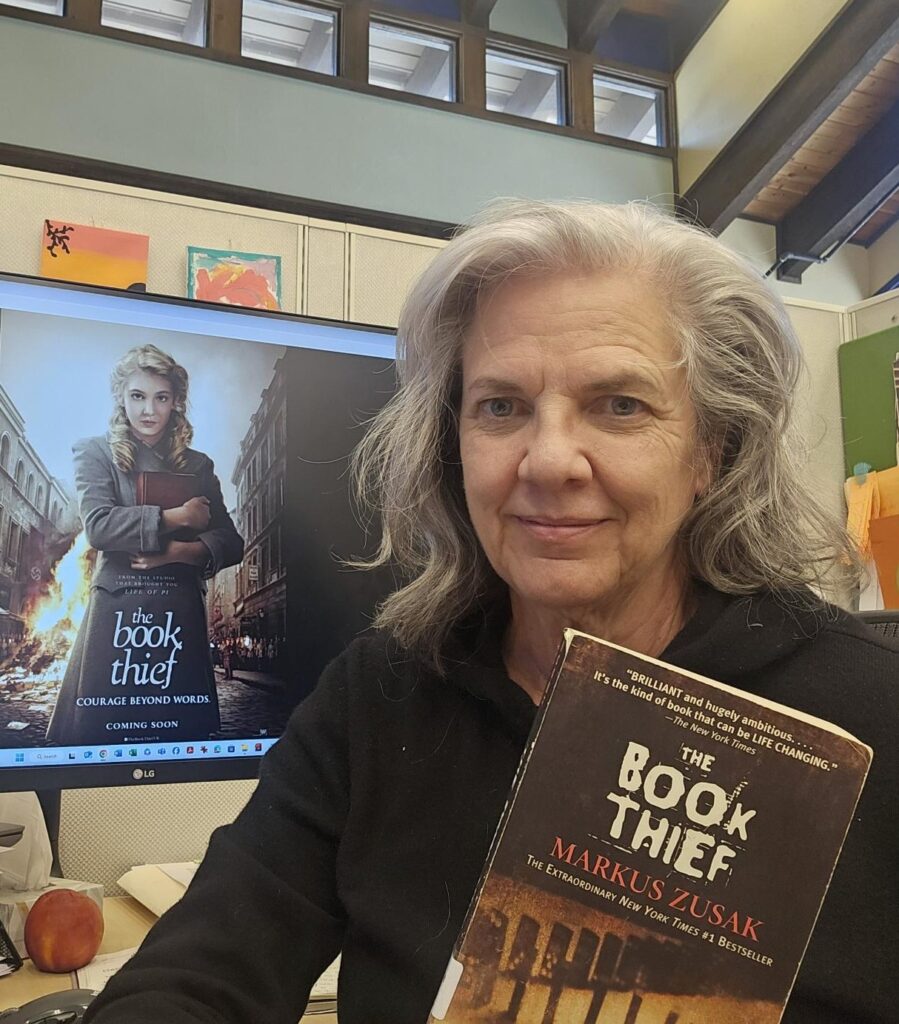Communications Manager Kyla Merwin recommends The Book Thief by Markus Zusak.
“When Death has a story to tell, you listen.”
This is the publisher’s first note in their description of The Book Thief. And well said.

Every now and then, a book lands in my lap that knocks me right off the couch. A tome that might take me two weeks to read (at 550 pages), The Book Thief instead launched me on a much longer journey—a two-month immersion of exquisite wording and finely wrought sentences that I read and reread and reread.
I carried phrases in the satchel of my mind to the grocery store, the dog park, to breakfast, lunch, and dinner, and into my dreams. Markus Zusak is Just. That. Good.
To wit:
“There were [travelers] of every stature, but among them the poor were the most easily recognized. The impoverished always try to keep moving, as if relocating might help. They ignore the reality that a new version of the same old problem will be waiting at the end of the trip—the relative you cringe to kiss.”
I mean, come on. Who writes like that? Well, Anthony Doerr does. And Doerr has pretty much owned me since the 2014 release of All the Light We Cannot See, which earned him a sweet little award called the Pulitzer.
But I digress. The Book Thief was penned by Markus Zusak, an Australian-German writer who has garnered a nice collection of awards of his own. But I digress again.
The novel drops us into 1938 Nazi Germany, where nine-year-old Liesel Meminger rides a train to a foster home in Molching. Her Communist mother can’t protect her from the Nazi tide, and her little brother, Werner, doesn’t survive the journey. At his graveside, Liesel pockets her first stolen treasure—The Gravedigger’s Handbook.
Liesel becomes obsessed with the written word, and with stealing books—rising from her desperate need for control and comfort in a world in which she is abandoned, powerless, and grieving. Words ultimately give her the means to shape her own story amidst the chaos of Nazi Germany. At the start of the book, ironically, Liesel is illiterate.
Says Death: “She was the book thief without the words. Trust me, though, the words were on their way, and when they arrived, Liesel would hold them in her hands like the clouds, and she would wring them out like the rain.”
Woven into the pages are characters that Zusak has illuminated in vivid detail, so compelling that you want to scoop them into your own life, and protect them and love them with all your heart.
Meet Hanz Hubermann, for example, Liesel’s foster father, whose eyes “were made of kindness, and silver.” His gentle spirit helps bring Liesel from her dark nightmares into the radiant world of reading.
The story is set in Nazi Germany, so things end badly. And yet, Death, who has been kept very busy during the war years, returns to Leisel’s story, not to claim it, but to hold it up—proof that even in the darkest times, words can keep the heart beating.
I’ll leave you with a final excerpt:
“Somewhere, far down, there was an itch in his heart, but he made it a point not to scratch it. He was afraid of what might come leaking out.”
I mean, come on.
###
Note: The Book Thief is the October pick for the Library’s Book Club, which will meet on Wednesday, October 1. As a complimentary offering, the Library will be screening the feature film based on the book, also titled The Book Thief (2013), on Tuesday, September 30. More about the Library’s Book Club here.
